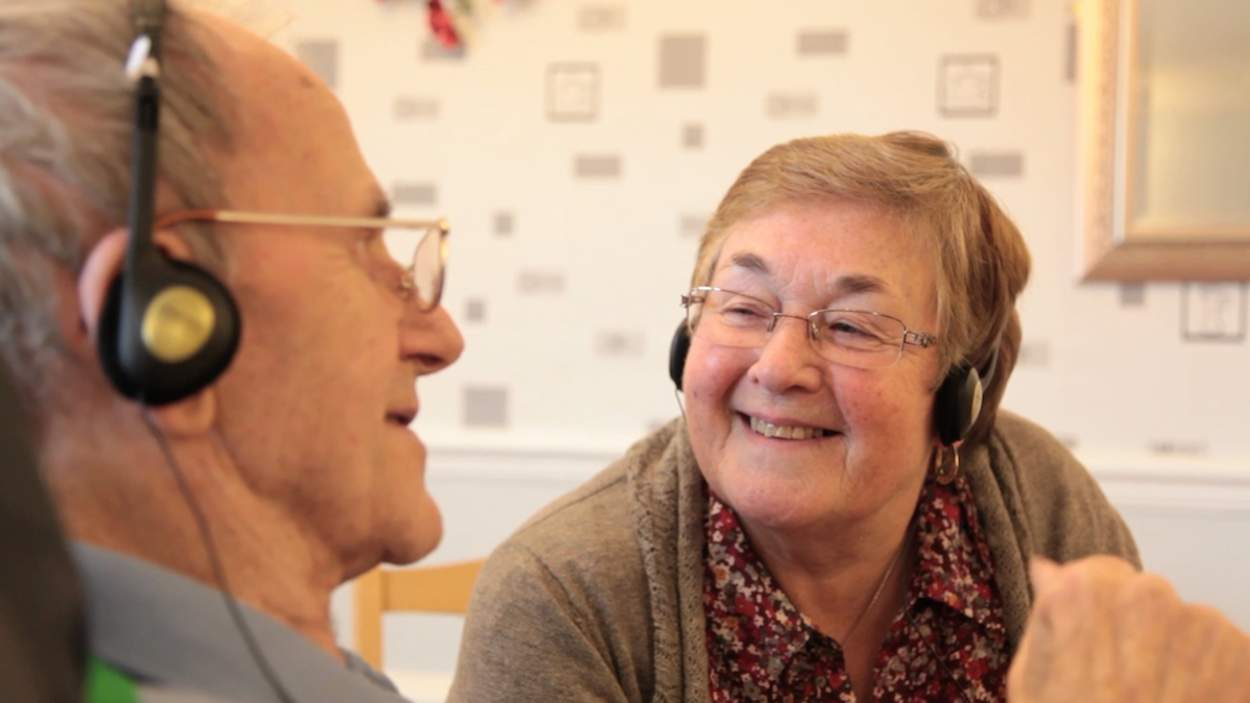Dementia care – dealing with behavioural changes
Tags
Dementia Care
People with dementia may begin to behave in ways that the people around them don’t understand, as the condition progresses. This can be upsetting to witness and difficult for families to process. For the person with dementia it can be just as tough, as they may be confused by how others respond or interact with them, or feel like they’re not being taken seriously or listened to.
Behaviour changes can sometimes be the first symptoms of dementia to appear. They may happen slowly and take a while to notice, or come on quite quickly. In this article, we’ve brought together advice from dementia specialists to help you manage and respond to a loved one’s challenging behaviour, protect their quality of life, and how to look after yourself in the process.
What are some of the challenging behaviours in dementia?
Becoming suspicious of others
People with dementia may become suspicious of others or accuse them of doing things they haven’t done – such as taking their possessions. If they lose something, they may panic and think they’ve been burgled. They may become paranoid and believe that everyone is watching them or planning something against them, or jump to conclusions without evidence.
Aggressive behaviour
A person with dementia can experience mood swings and aggression. This can be especially upsetting and scary when it is totally out of character, and many people find it the hardest part to deal with.
Aggression caused by dementia may include –
Verbal aggression – Swearing, shouting, making threats or insults
Physical aggression – hitting, pinching, scratching, or throwing things
Aggression isn’t always a symptom of dementia itself. The Alzheimer’s Society says aggression may also result from language and orientation problems, an unsuitable environment, feeling out of control or unable to do things, or frustration that those around them are behaving in a way they don’t like or can’t make sense of.
Repetitive behaviour and anxiety
People with dementia can repeat themselves a lot – this may mean doing the same physical activity over and over, or saying the same thing, or making the same gesture or noise.
This may be due to memory loss and a person being unable to recall what they’ve already done or said. For example, they may keep checking their pocket for their house keys. They may ask the same question again and again because they’re feeling anxious and are looking for security and confirmation.
Sundowning
Sundowning is a term for late-day confusion, or when a person’s behaviour gets worse towards the end of the day. A person experiencing sundowning may experience common symptoms such as rocking while sitting down, pacing or feeling restless, seeing or experiencing things that aren’t there, or being more confused than usual.
Why do challenging behaviours happen?
The Alzheimer’s Society states that the impact of dementia on the brain and subsequent symptoms can make it harder for people to communicate and fulfil their basic needs. These needs include things like being able to drink when we feel thirsty, telling others how we’re feeling, and choosing when we do certain daily activities.
Not having these needs met, trying to meet these needs alone without the right skills or ability, or being unable to tell others what these needs are can cause frustration and unexpected changes to behaviour, as a person tries to make sense of and navigate their situation.
How can you manage challenging behaviour in dementia?
While there are some specific actions you can take which may help manage specific behaviours, The NHS also suggests the following general advice –
- Speak to a GP to rule out any underlying cause, such as an illness, pain, constipation, or side effects of medication they are taking.
- Keep a diary for a couple of weeks to help identify what may be triggering behaviour changes. Think about –
- The time of day each behaviour change happens
- How the person is responding or interacting with their environment
- What happened directly before the change? Was the person asked to do something?
- Stick to a familiar routine, with plenty of meaningful activities that the person enjoys. Daily routines help a person with dementia know what to expect.
Responding to repetition
Try to establish why they’re repeating their behaviour, so you can help break the cycle. If you think they’re bored, it may help to engage them in an activity that they enjoy, such as watching TV, listening to music, or talk about something they like talking about.
Other things to be mindful of include –
- Practicing patience
- Assisting the person in finding the answer themselves. For example, if they keep asking what day it is, you may find it helpful to put a digital calendar somewhere prominent in their home.
- Offer general reassurance

Managing suspicion or hiding things
It’s important to remember that while this behaviour may appear paranoid and delusional to you, the feelings and concerns your loved one is experiencing are very real for them.
You may wish to try –
- Encouraging them to talk about it to help identify the root cause
- Acknowledging their concerns so that they feel listened to and valued
- If they think something’s been stolen, offer to help them find the missing item as a distraction
- Try to keep things in obvious places, and keep cupboards and drawers tidy
Loss of inhibitions
Sometimes people with dementia may behave in a way that other people find inappropriate or embarrassing. They may say something rude, undress at inappropriate times, or display sexual behaviour in public. This can be distressing to witness, however, often the person thinks they’re behaving appropriately, so the situation will need to be handled delicately.
You may want to try –
- Looking at certain behaviours from the perspective of the person with dementia. For example, something that appears sexual may not be – a person may undress simply because they’re too hot or find their clothes too itchy.
- Be mindful of the person’s dignity. While it will likely feel important to resolve the behaviour as quickly as possible, telling them off may make the situation worse.
- Get a free dementia help card, to easily communicate the reason behind their behaviour to others.
Responding to aggression
Try and identify any triggers that set off aggressive reactions to avoid them in future. Don’t argue or become aggressive yourself – if you find this hard, remove yourself from the room when safe to do so and take some deep breaths. Always remember, even if it seems very personal, their behaviour isn’t your fault. When your loved one has calmed down, act normal once again to move forward.
Supporting restful sleep
Dementia can impact a person’s body clock. A person with dementia might find it harder to sleep at night, wake during the night thinking it’s time to get up or fall asleep often during the day.
Sleep disturbances are tricky for carers too, as they impact their own sleep and may cause them to feel run down or less alert during the day.
Poor sleep quality may leave a person with dementia tired and irritable, which may make certain challenging behaviours worse.
You may wish to support better sleep patterns by –
- Helping a person with dementia get plenty of natural daylight during the day
- Create a comfortable evening environment by closing curtains and turning down bright lights
- Encouraging music therapy, such as playing favourite songs or calming instrumental music in the evening, may also help calm a person and get them ready for bedtime
Looking after yourself
Changes in how a loved one is acting can be challenging and often very upsetting. You may feel like you can never relax – always waiting to see what they do next, and worrying about how you’ll handle it. You may feel differently about your loved one, which can cause guilt.
Over time these complex emotions can add up and impact your mental health, and leave you feeling physically exhausted. Looking after yourself is not only important for your long-term wellbeing, it’s essential to keeping your loved one safe and well too. When you’re feeling burnt out, you may find it more difficult to concentrate or respond to things, such as an emergency or threat of danger, quickly.
Support is available. The Carer’s Trust can help you find a local support group where you can talk to and share experiences with other dementia carers. Your own GP may be able to help with this too, Or you may wish to join an online support forum, where you can remain anonymous.
If you need someone to listen to how you’re feeling and offer advice, you can also speak to a specialist dementia nurse for free through Dementia UK’s Admiral Nurse Dementia Helpline.
Alternatively, you may find it useful to arrange mental health support in the form of NHS or private talking therapy.
Finally, remember that you don’t have to deal with a loved one with dementia on your own.
Arranging live-in dementia care can also help keep your loved one safe in their own home, while offering you time away to focus on your own wellbeing. The constant presence of a dedicated carer can be a calming influence and help manage confusion or agitation through a regular and comfortable routine. It can also give the family peace of mind that someone is there to support them around the clock.
Even if you’d prefer to remain as a loved one’s carer yourself, it’s important to make time for your own needs and those of your immediate family. Respite care gives you a much-needed break, and most private live-in care companies will create a package to suit your relative’s exact needs, you might find that the cost of live-in care works out cheaper than a residential care facility.
Learn more about dementia care
Take a look at more Elder guides on how to support those living dementia below.

What are the 7 stages of dementia?
Every dementia experience varies from person to person. However, understanding how the condition progresses can help you to plan for the future, and arrange

Dementia care – how do I pay for it?
Dementia Live-in Care: How Do I Pay for It? If your loved one is living with dementia, it can be difficult to work out

Types of dementia
Common types of dementia Every dementia journey is different, and not everyone will experience the same symptoms. However, understanding the different types of dementia

What are the signs of dementia in women?
Did you know women have a greater risk of developing dementia over their lifetime than men? 600,000+ women in the UK are currently living

Dementia and sundowning – advice for caregivers
Dementia care – what is sundowning? Sundowning – sometimes referred to as ‘late-day confusion’ – is a symptom that causes those living with dementia

Discrimination and dementia
Overcoming discrimination and stigma can be a huge challenge for those living with dementia. We’ve looked at some of the common situations where people